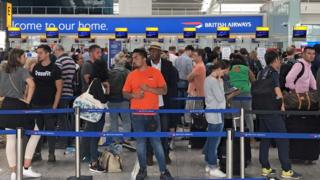Travel delays: Air traffic control problem affects Heathrow and Gatwick
 Image copyright PA Media
Image copyright PA Media Rail and air passengers are being hit by more delays after record-breaking temperatures caused travel chaos on Thursday.
Rail companies feared rail lines would buckle – but it was sagging overhead cables which have led to problems.
There are also delays and cancellations due to weather at London airports, including Heathrow and Gatwick.
A technical problem with the UK’s air traffic control system is also causing problems.
Nats – which controls UK airspace – said there is a problem at Swanwick Control Centre which it is trying to fix.
Martin White and his wife were stuck at Naples Airport after their Thursday night flight to Gatwick Airport was cancelled due to the weather.
“Everybody is packed liked sardines and there are fraying tempers,” Mr White said.
Friday has been cooler than Thursday, with temperatures ranging from 23C to 25C in most areas (73F to 77F), rising to 27C in south-east England.
During the day it is expected to be mostly dry but rain is expected to develop across northern and eastern areas of the UK overnight.
The disruption to flights on Thursday evening and into Friday was caused by storms across Europe.
Luton Airport had five cancellations on Friday morning while Gatwick Airport had 19.
Heathrow Airport issued an apology via Twitter for the disruption, and advised customers to speak to airline providers for more information.
Guy Holloway’s morning flight from Heathrow to Oslo was cancelled due to adverse weather.
“After 2.5 hours we are now near the front of the queue to be rebooked,” he said on Friday morning.
The Independent’s travel editor Simon Calder said “dozens” of the cancelled flights were on easyJet and there were “some very long delays on British Airways”.
Meanwhile, on the rail network, speed restrictions on Thursday prevented lines from buckling in the heat, but damage to overhead lines left some commuters stranded in London on Thursday night.
Despite working “flat out” to repair the damage, disruption continued into Friday and Network Rail advised passengers to check with their train operator before travelling.
- East Midlands Trains urge passengers not to travel on its London St Pancras/Nottingham/Sheffield route, and an emergency timetable is in place
- Thameslink services – which operate on part of the same route – is also disrupted, with half of its lines unavailable
- Great Northern said it has a heavily reduced service, particularly on routes to and from Peterborough
- All Eurostar trains to and from Paris have been severely disrupted due to a cable exploding, and delays between 30 minutes to an hour are expected on the Brussels route.
Many operators said tickets for Friday could be used the following day, and offered compensation to season ticket holders who did not travel on Thursday.
However, Govia Thameslink Railway, which operates trains in south-east England, initially said passengers with an annual pass would only be entitled to compensation if they attempted a journey on Thursday and were delayed – despite it urging customers to avoid travelling where possible.
But the firm then reversed its decision, saying passengers with an annual pass would be entitled to a payout even if they did not attempt a journey on Thursday.
Anthony Smith, chief executive of independent watchdog Transport Focus, said: “All passengers told not to travel due to extreme weather should be entitled to claim compensation.”
Thursday saw the UK’s second hottest day – and hottest July day – on record, with temperatures reaching 38.1C (100.6F) in Cambridge.
Are you currently experiencing delays to your journey? Please email haveyoursay@bbc.co.uk
Please include a contact number if you are willing to speak to a BBC journalist. You can also contact us in the following ways:
- WhatsApp: +44 7756 165803
- Tweet: @BBC_HaveYourSay
- Send pictures/video to yourpics@bbc.co.uk
- Upload your pictures / video here
- Text an SMS or MMS to 61124 or +44 7624 800 100
- Please read our terms of use and privacy policy







